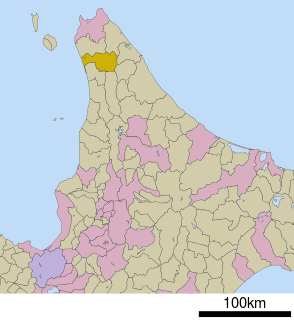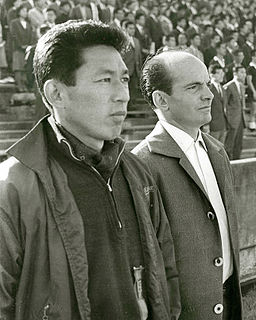
Sukagawa is a city located in Fukushima Prefecture, Japan. As of 1 May 2018, the city had an estimated population of 76,251 in 38824 households, and a population density of 270 persons per km2. The total area of the city was 279.43 square kilometres (107.9 sq mi).

Naganuma was a town located in Iwase District, Fukushima Prefecture, Japan.

Naganuma is a town located in Sorachi Subprefecture, Hokkaido, Japan.

Yūbari is a district located in Sorachi Subprefecture, Hokkaido, Japan.

Horonobe-cho is a town located in Sōya Subprefecture, Hokkaido, Japan. There is a JR train station, Horonobe Station which connects Horonobe-town with other cities in Hokkaido.
Hideki Naganuma is a Japanese composer and DJ who primarily does work for video games. Naganuma is best known for his score for the game Jet Set Radio and its sequel Jet Set Radio Future.

A punch perm is a type of tightly permed male hairstyle in Japan. From the 1970s until the mid-1990s, it was popular among yakuza, chinpira, bōsōzoku, truck drivers, construction workers, and enka singers. The punch perm began to fall out of usage as a result of its general association with the yakuza, as well as normal fashion trends. The style is similar to the Jheri curl, which was popular in the United States during roughly the same time frame, but the curls in a punch perm are much tighter.

Miyako is a town located in Miyako District, Fukuoka Prefecture, Japan.
15350 Naganuma, provisional designation 1994 VB2, is a stony background asteroid from the inner regions of the asteroid belt, approximately 4.3 kilometers (2.7 miles) in diameter. It was discovered on 3 November 1994, by Japanese astronomers Yoshio Kushida and Osamu Muramatsu at the Yatsugatake South Base Observatory. The likely S-type asteroid has a rotation period of 2.5 hours. It was named for the town of Naganuma in northern Japan.

Ken Naganuma was a Japanese football player and manager. He played for Japan national team. He also managed Japan national team. He was the president of the Japan Football Association from 1994 to 1998.

Inagi-Naganuma Station is a passenger railway station located in the city of Inagi, Tokyo, Japan, operated by East Japan Railway Company.

Naganuma Station is a passenger railway station located in the city of Hachiōji, Tokyo, Japan, operated by the private railway operator Keio Corporation.

Naganuma Station is a railway station in Aoi-ku, Shizuoka, Shizuoka Prefecture, Japan, operated by the private railway company, Shizuoka Railway (Shizutetsu).
Japanese football in 1930.

Naganuma Dam is a dam in the city of Tome, Miyagi, Japan, completed in May 2014. The dam is located on the Hasama River, a branch of the Kitakami River system.
In mathematics, the Doi–Naganuma lifting is a map from elliptic modular forms to Hilbert modular forms of a real quadratic field, introduced by Doi & Naganuma (1969) and Naganuma (1973). It was a precursor of the base change lifting.
Yoichi Naganuma is a Japanese football player for Ehime FC on loan from Sanfrecce Hiroshima.
Hiroshi Naganuma is a Japanese professional shogi player ranked 8-dan.












